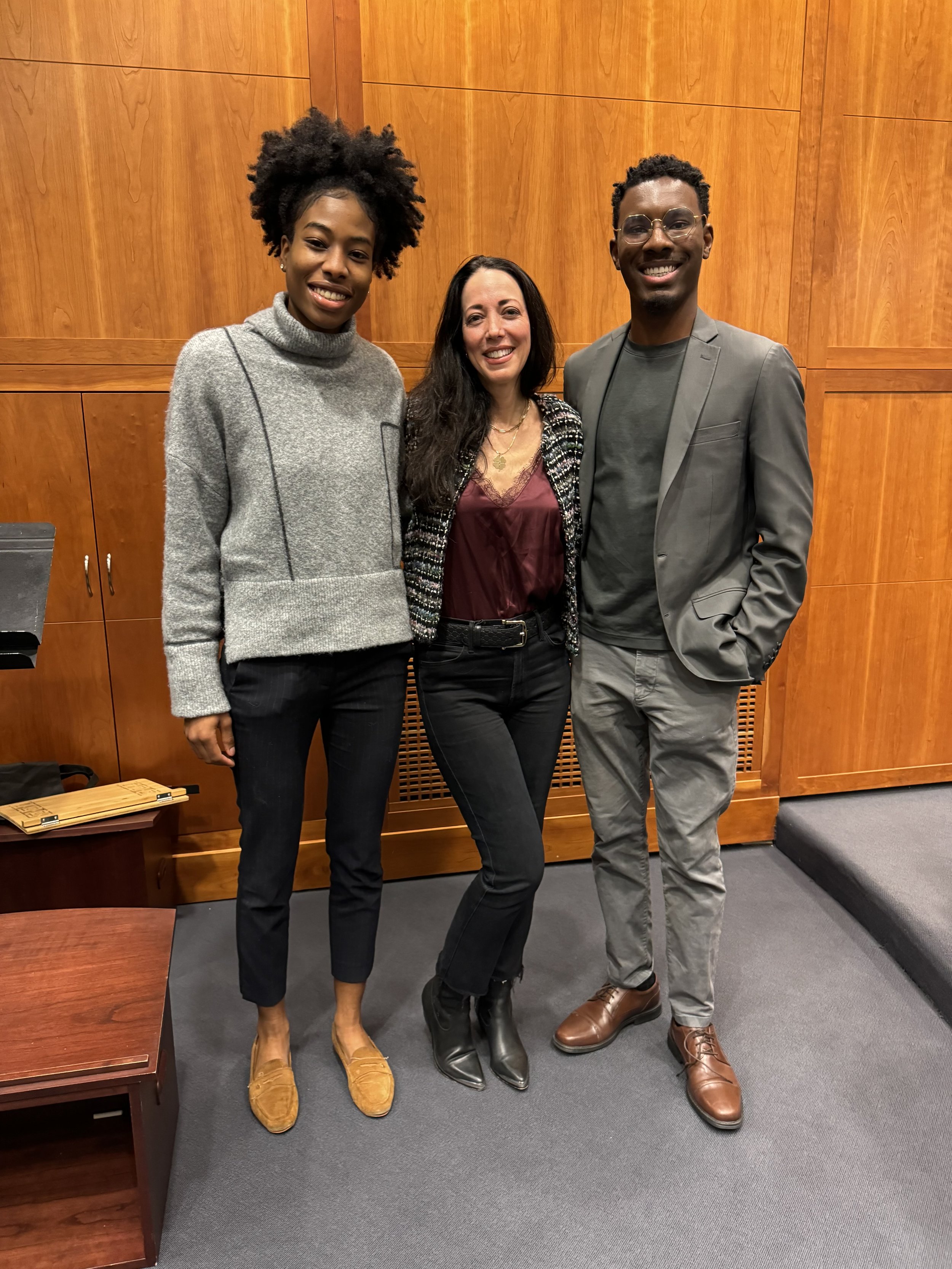BLSA Brings Rappaport to Talk Entertainment Law, AI in Music
Ashanti Jones '26
Features Editor
Friday, March 1, the University of Virginia School of Law’s Black Law Student Association (BLSA) hosted Kim Rappaport, Senior Vice President of Business and Legal Affairs for Columbia Records, for the latest installment of their Breaking Ground Speaker Series. Rappaport discussed the intricacies of entertainment law, her personal legal career path, and current issues in music law, such as the growth of artificial intelligence (AI). The event featured a moderated interview by Nia Saunders ’25, BLSA Vice President, and Kyle Trotman ’26, BLSA Interim Social Action Chair, followed by questions from the audience.
Pictured (left to right): Nia Saunders '25, Kim Rappaport, Kyle Trotman '26
Photo Credit: UVA Law
In addition to her current role at Columbia Records, Rappaport served as Senior Director of Business and Legal Affairs for Sony Music Entertainment and RCA Records and was recognized as a Billboard Women in Music Executive Honoree in 2023. Throughout her career as an entertainment lawyer, Rappaport has worked with notable artists such as Beyonce, Lil Nas X, and Adele.
Trotman began the interview by asking Rappaport about her unique path to practicing entertainment law. Rappaport started her professional career with a bachelor’s in architecture from Cornell University, but soon after she pivoted and pursued a law degree at American University Washington College of Law, where she graduated magna cum laude.
“People take many journeys in education and then finally make a decision, so for me that journey started from an early age with art, design, and music,” Rappaport said. “I sort of compromised with my parents, who were like ‘you can’t go to art school, you’re not going to be able to support yourself.’ They were right, I couldn’t really support myself, so I went to law school.”
Rappaport began her legal career as an associate in the Washington D.C. office of Arnold & Porter. Rappaport shared with the audience her experience as a BigLaw associate and how her work with Arnold & Porter gave her an unusual opportunity to break into entertainment law. “I worked my way into the IP litigation group, because at the time they had business with the RIAA, which is the lobbying organization for record labels,” Rappaport said. “We represented all the labels on a big anti-piracy case…and I led the damages case, which wasn’t the sexiest work, but I really got to interact with all the record labels.”
One evening, Rappaport faced off with a team of eight or more lawyers alongside some of Sony’s in-house lawyers on a matter pertaining to the case. Over the course of the night, Sony’s in-house team departed, leaving just Rappaport and one other attorney, which eventually turned into just Rappaport. “[Arnold & Porter] left me alone for the weekend with the client, it’s like 1 a.m., we’re still on the phone with Winston & Strawn, and this senior Sony lawyer said ‘I have to take a nap,’” Rappaport said.
Feeling a little outnumbered, Rappaport asked the senior lawyer if there were any other Sony lawyers they could phone for backup, to which the senior lawyer responded they had no junior associates in the department at that moment. Noticing a prime opportunity, Rappaport seized the moment and pitched herself on the spot. “I went back to the office I was borrowing, printed my resume, came back with an additional coffee and a bread product, and that’s basically how I made the move,” Rappaport said. “He asked me ‘you want to do this?’ and I said ‘yea, I’d actually love to.’”
Rappaport clarified her role as an in-house entertainment attorney does not involve talent scouting, it is purely on the side of talent acquisition, which she believes is probably for the best because sometimes she has discounted artists that have turned out to be a huge success for the label.
“They didn’t hire me for my creative judgment, and a lot of the times I’m wrong,” Rappaport said. “I was working on Little Nas X, and when we first found the early version of ‘Old Town Road’ and my CEO was dm’ing him, I thought it sounded like a nursery rhyme. Shame on me, Little Nas X has surpassed Elvis and the Beatles, he’s a delight and he’s a creative marketing genius.”
Saunders shifted the conversation by asking Rappaport about the effects of AI on the music industry and how entertainment lawyers are accommodating or challenging these effects. “AI, at least for Sony, is probably one of the biggest topics,” Rappaport said. “All the music companies fear it’s going to cannibalize the industry like digital anti-piracy did.”
Rappaport explained the best way to combat the negative effects of AI, as of now, is to contract around it as best as they can, but mainly by restricting an artist’s ability to grant rights to their music to AI. “The whole point of a recording agreement and the crux of our company is getting these exclusive rights,” Rappaport said. “We don’t want another company to basically flip it on us and do any re-records. Like with Taylor Swift, you see the problem of the re-record…people are rushing to buy the re-record instead of the original, which is the same fear with AI, so we’ve been working in AI-specific language into our contracts . . . because we don’t want to be caught behind on technology.”
---
alj3emz@virginia.edu

